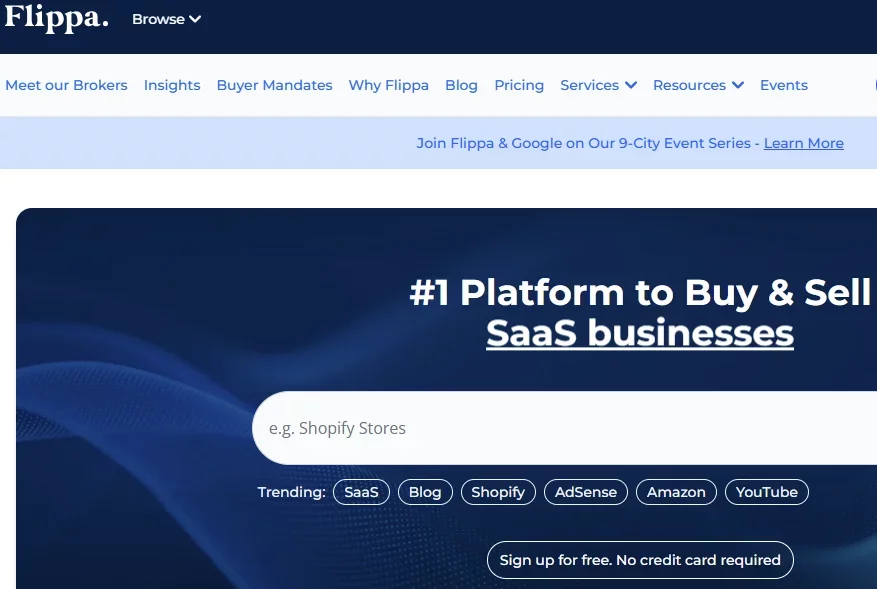In the rapidly evolving SaaS landscape, the decision to sell your business can be phenomenal. It could be a strategic move for growth, a pivot in your business model, or a necessary decision due to changing circumstances.
Selling a SaaS business has its own set of challenges.
This article will guide you in preparing your company for the sale, the steps of the actual sale, and some unique tips to get the most out of your deal.
Selling your business can be complex, especially if it’s SaaS. It requires careful planning, strategic decision-making, and a deep understanding of your business's worth. Here are the steps involved in selling your SaaS business.
1. Valuation
2. Find a buyer
3. Negotiate a deal
4. Transfer ownership
5. Perform due diligence
Selling the SaaS business is a significant decision that can have far-reaching implications for your future. By following these steps, you can ensure a smooth and successful sales process.
But you don’t have to do this alone. We at Exitwise are with you. We'll help you hire the right M&A (merger and acquisition) experts to guide you through each step of your SaaS business sale.

A SaaS marketplace is a digital platform where you can list your business for sale for more visibility and access to a broad customer base.
You can list your SaaS business for sale on top marketplaces such as:

Empire Flippers is a great place to sell your business as the platform prioritizes high standards for listings, such as only accepting revenue-generating businesses and verifying ownership and traffic numbers.
As such, the marketplace attracts serious potential buyers, which can mean selling your company sooner.
Founded in 2011, Empire Flippers publishes rigorously vetted businesses for sale every Monday and has sold over $520 million worth of online businesses.

Flippa is a top-rated online marketplace for selling and buying digital businesses, including SaaS companies.
With Flippa, thousands of buyers can see your SaaS listing since potential buyers register for free. Buyers can search for SaaS businesses to buy by price and the age of the business.

Like Empire Flippers, Acquire.com lists hundreds of pre-vetted SaaS ventures for sale, which attracts thousands of serious entrepreneurs and increases your chances of a faster sale.
The marketplace supports listings from different countries, including the US, France, India, Romania, and the United Kingdom. Your location won't be a limiting factor for exiting your business.
Additionally, you don't have to pay anything for your listing if the platform can't find you an ideal buyer.

BizBuySell is one of the most active marketplaces and is part of a network that generates over three million monthly visits.
Your listing will gain more exposure than on most other similar marketplaces.

Started in the 1990s as an online bulletin board, BusinessesForSale has since grown into a leading platform for introducing potential buyers to business sellers.
The platform serves listings from over 130 countries and is one of the largest marketplaces for advertising businesses for sale globally.
As you'll notice, simply listing your business on these marketplaces doesn't always guarantee a successful sale. Instead, you can work with us to find the best SaaS M&A experts to help you every step of the way.
Unlike these marketplaces, you can expect the following benefits when you work with us at Exitwise:
Work with us today to actualize the exit of your dreams.
When creating a SaaS business listing on a marketplace, here are the elements to focus on to attract buyers:
The trick is to provide as much basic information as possible, enough to pique the buyer's interest, but without sharing too much prematurely.
The type of information you should add varies depending on the marketplace.

When selling your SaaS business, you have two main options. You can conduct a private sale or work with SaaS brokers for an easier but costly route.
Let’s look at each approach:
A private sale involves selling your business directly to a buyer by yourself without the involvement of a third party. An interested buyer can approach you, asking to buy your business, or you may reach out to prospective buyers independently.
Here are a few advantages and disadvantages of private sales when selling your business.
Pros:
Cons:
When selling your SaaS business, hiring a broker can offer several benefits:
Looking for buyers on your own puts you in complete control of the process but can be time-consuming. On the other hand, hiring a broker may free up your precious time and bring in vetted and genuinely interested buyers.
But before you dive into prospecting buyers, you must understand your company’s position.

Before selling your SaaS company, you must evaluate it based on key metrics. Let’s look at some of them.
Most SaaS businesses work on monthly or yearly subscription-based models. The churn rate calculates how many subscribers cancel the service, monthly or annually. A high churn rate is not a good indicator and reduces the value of your business.
CAC is the cost of acquiring a new customer in sales and marketing. LTV is a metric that calculates the average revenue to expect from a customer over the entire engagement period. Low CAC and high LTV are indicators of a good business model.
MRR calculates the recurring revenue of a SaaS business over a particular month, while ARR is the recurring revenue over a year. A high score for both metrics will give your business a higher value.

Here are a few factors to consider when selling your SaaS business:
The financial health of your business is a crucial consideration for potential buyers because they eventually want to maintain and improve its profits. Some factors to consider are low liabilities and risk, profitable balance sheets, and high LTV.
The scale and loyalty of your customer base are directly proportional to your business's value. So, ensure you have a loyal customer base, if not a big one.
A strong management team can be valuable in demonstrating the company's leadership and strategic capabilities.
Your business's positioning and competitive landscape can influence its attractiveness to potential buyers. You can command a remarkably high price if your SaaS business is already an established or rising brand.
Selling your SaaS business should be a strategic and adequately thought out decision. Focus on maximizing the business's value a year or two before you plan on selling it so you get the maximum price out of it.
Since each business is unique, these factors may vary in importance based on the specific circumstances of your SaaS business.

Potential buyers conduct due diligence on a target SaaS business by scrutinizing key aspects such as revenue and profit creation, market size, customer support, and more.
Here's a quick checklist of the key items buyers focus on:
When selling your business, conducting reverse due diligence is important to uncover potential issues in the above aspects that may put off the buyer.
You'll also need to facilitate the buy-side due diligence to help the buyer assess your business to their satisfaction.

If you're considering selling your software company, it’s essential to be prepared beforehand. Here's how you can prepare your SaaS business for sale:
Utilize analytics tools to collect precise data about your business and get an accurate idea of its current position.
Such data can include:
And more.
Accurate data gives potential buyers a clear picture of your business's performance and future potential.
Keep your financial records organized, transparent, and up-to-date. These records usually include:
Demonstrating profitability is crucial as it shows potential buyers that your business is financially healthy and has the potential for future growth.
As discussed above, metrics play an essential role in determining the value of your SaaS company. That’s why you should familiarize yourself with crucial SaaS metrics such as churn rate, customer acquisition cost (CAC), lifetime value, and monthly and annual recurring revenue (ARR).
Ensure that these metrics are largely according to industry standards. If they're not, you should work towards getting them on track to improve your business's valuation.

SaaS businesses will have different operating processes than other businesses. That’s why you should document all your business processes and establish SOPs for streamlined and efficient operations. It includes daily operations, customer service procedures, marketing strategies, and product development processes.
Having well-documented SOPs can make your business more efficient and make the transition smoother after the sale.
You should check if all clauses in the employee contracts comply with the employment laws since these can affect the sale. The contracts should cover essential aspects such as:
Also, consider the impact of key employees on your business and the potential implications of their leaving after the sale.
Finally, you must prepare your business for sale by enhancing its strengths and addressing its weaknesses. It includes setting a realistic price for your business, preparing a compelling sales memorandum, and marketing your business to potential buyers.
Positioning your business correctly can significantly influence buyers' perceptions and final sale price.

Selling your SaaS business can be complex, but breaking it down into small steps can make it more approachable.
Here's a step-by-step guide on how to sell your SaaS business:
The first step in selling your SaaS business is determining its worth to understand the expected price. You should understand your business's financials, including revenue, profit margins, and growth rates. You can use various factors, such as your customer base (demographics and size), product offering, and market position, to determine the value.
Once you have the data, you can use our valuation calculator to get a fair idea of your company’s valuation.
Once you've determined the worth of your business, the next step is to find the right buyer. It can be an individual, an interested competitor, or a larger company looking to expand its product offering.
You can search for buyers on your own or hire a seasoned M&A team with us to find the right buyer that fits your needs.
Once you finalize a buyer, the buying company will perform due diligence to get an overview of your company and understand if the deal can match their needs. They will look for factors like the reason for sale, marketability of your product or service, and complexity of the business structure, among other things.
In this step, you provide all the documents the buyer’s due diligence team needs, including financial records, operational documents, intellectual property documents (if any), and more.
After the potential buyer is satisfied with the due diligence, you will need to negotiate the terms of the sale, such as the sale price, type of merger, and any specific conditions for the sale. You must understand what you want from the deal and be prepared to negotiate to achieve your desired outcome.
If you’ve not negotiated a sale of a company before, consider hiring an expert M&A lawyer. They have years of experience selling various types of businesses and can negotiate terms according to your needs.
Once you have negotiated and agreed upon the deal, the next step is to transfer ownership of your business. You must hand over the business's assets, including intellectual property, customer contracts, and employee agreements, to the buyer.

Selling a SaaS business requires careful financial and legal preparation and due diligence.
You'll need to consider the following legal aspects:
Below are the major financial considerations when selling your business:

Selling a SaaS business can present several challenges. Here are some of the most common ones and tips on how you can avoid them:
Buyers may have objections to cost, integration, or doubts about the product/service's effectiveness. To address these objections, you must conduct in-depth research and provide well-informed responses. You can also back these up with solid evidence, such as case studies, ROI calculations, 409a valuation, and testimonials.
The SaaS industry is highly competitive, making it challenging to stand out among competitors. To overcome this, focus on showcasing your SaaS product's unique value (unique selling proposition or USP) and benefits and build confidence in your prospect's mind.
If you have a high-value SaaS business, you'll likely attract a lot of interest from potential buyers. However, not all prospects will be suitable buyers. That's why you need to separate qualified leads from unqualified ones to have a better chance of finding a perfect buyer.
With the right strategies and resources, you can successfully navigate these challenges and sell your SaaS business at the right price.

You'll want to choose the right M&A advisor to help you sell your SaaS business successfully. With so many advisors in the industry, finding the right one can be tricky.
Let's check out some key factors to consider in an M&A advisor:
It's important to note that selling a SaaS business takes more than just an M&A advisor. You'll need other M&A experts, such as financial accountants, wealth advisors, and investment bankers.
The good news is that you don't have to find these experts alone. At Exitwise, we can help you find the best M&A team with experience and expertise in your SaaS sub-sector.
We'll even help you manage the team until your business sells. Reach out to us today to find the right experts to sell your SaaS business at the best terms possible.

Let's answer some commonly asked questions about selling your SaaS business.
Selling a SaaS business can sometimes take six months to a year (or even more). Factors that affect this timeline may include the selling price, the complexity of the business model, the type of deal, the company's ownership structure, and more.
Hiring an advisor when selling your SaaS business can help maximize your valuation, reduce the deal's risk, leverage your network, and allow you to focus on your business. An advisor can provide expert guidance, find suitable buyers, and help ensure a smooth deal.
The most common types of buyers that acquire SaaS businesses include private equity firms, venture capital firms, angel groups, and other companies in the SaaS space. The type of buyer can depend on factors such as the business's scale, profitability, and growth potential.
Selling your SaaS business can be complex and challenging because of its nuances. However, with the proper preparation, understanding of key metrics, and a strategic approach, you can navigate this journey successfully.
You should focus on improving the business's value before pitching buyers, prepare all the necessary documents, and seek the help of SaaS brokers or M&A experts to help with the sale.
If you’re overwhelmed with the sale process, worry not. Exitwise can help you find the right experts to build your dream team of professionals. Connect with us to start your journey toward a successful business exit today!
Let Exitwise introduce, hire and manage the best, industry specialized, investment bankers, M&A attorneys, tax accountants and other M&A advisors to help you maximize the sale of your business.

